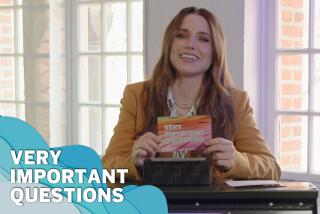Merilene Murphy, 51; poet, literary activist and publisher
To every creative endeavor there is a practical side: the unglamorous work that aids and abets the art. At the World Stage in Leimert Park, a performance gallery where artists gather to share and hone their craft, Merilene M. Murphy was a poet and a master of the practical.
As a volunteer she helped book the featured poets who read their work each Wednesday night, upgraded the website, sent out a weekly update to keep artists informed and helped create a buzz about the good things happening at “The Stage.”
Murphy’s work on behalf of the institution was as much an expression of her love for poetry as the poems she read in front of audiences.
“It made so much of a difference having her here,” said Jawanza Dumisani, director of literary programming for the World Stage. “She’s been priceless to us.”
Murphy, a literary activist and publisher known throughout Los Angeles for her support of poetry, died of cancer Feb. 2 at Cedars-Sinai Medical Center. She was 51.
A newly released collection, “Voices From Leimert Park: a poetry anthology,” includes her work. She is also the author of “Under Peace Rising: Poems in English, Spanish and French,” a collection of poems dedicated to peace.
“Her poetry was like listening to Thelonious Monk,” said poet and friend Peter Harris. “If you expected a line to go where you thought it might, she always fooled you. It was always a better place where she took it.”
Murphy was born March 20, 1955, in New Rochelle, N.Y., and raised there and in Harlem. Her mother, an educator, and her father, a World War II veteran, instilled pride in their daughter and expected achievement. When she was a young girl, Murphy was part of a lawsuit filed by her mother against the school board in New Rochelle, contesting the practice of school segregation, said her sister Diane Murphy of Los Angeles, who survives her, along with brothers Derek Miller and Kenneth Miller of New York.
The family won the lawsuit, and in the first grade Murphy and others were bused to a previously all-white school. It was in those very early years that she began writing poetry.
Murphy earned a bachelor’s degree in journalism and international affairs at Iowa State University. In the 1980s she moved to Los Angeles and found a cultural home in Leimert Park and its burgeoning arts community. The Wednesday evening gathering at the World Stage, known as the Anansi Writers Workshop, consists of a featured poet, an open mike and a workshop. It requires a constant stream of talent, which Murphy helped supply.
“The caliber of the people she brought in was five-star: Wanda Coleman, Suzanne Lummis ... Jervey Tervalon, S.A. Griffin, Talaam Acey -- poet after poet, really, really great readings,” said Dumisani.
An early participant in the Internet revolution, Murphy dubbed herself a “poet-tech” and in 1994 created Telepoetics, a nonprofit dedicated to promoting and distributing poetry using telephone and Internet technologies. Using teleconferencing, Murphy gathered poets in Los Angeles and linked them to poets gathered in cities such as New York or Chicago for readings and dialogue about the arts.
“It was a revelation,” said Harris. “I was still fighting the Internet back in those days ... and she was already claiming it and using it.”
For many years Murphy worked as a legal secretary, but her concern about young people and the health of the community often led her to work with nonprofit organizations, where she used poetry to heal. A year after a celebrated gang truce by the Crips and the Bloods, she organized a poetry festival, “Peace L.A.: The Poetics of Gang Truce.”
“Poetry is my way of getting something going, bridging a gap,” Murphy said in a 1993 interview with The Times. “The gang truce document is far-reaching. It’s a working piece of art we can act on, help make real.”
She led workshops for high school students, addicts in recovery, public school administrators. The starting point was the validation of each person’s voice. Feisty, bold, full of opinions that she readily shared, Murphy never seemed to doubt the validity of her own voice.
“Merilene was loud,” said her friend and fellow poet, Imani Tolliver. “Even though she was really loud, she was very gentle.... She really encouraged all of us to speak and to be.”
Through Telepoetics, Murphy published other writers, including performance artist Keith Antar Mason.
As she lay in the hospital, poets visited and some read poetry to her. By then the illness had robbed her of the ability to speak. Her poems and those she inspired were left to speak for her.
let me begin as if i were -- poet --
maker -- creator
let me end as if -- we are all poets
& then all’s not lost between
At 2 p.m. on March 18, poets will pay tribute to Murphy at Beyond Baroque, 681 Venice Blvd., Los Angeles. On March 21 at 7:30 p.m. a tribute will be held at the World Stage, 4344 Degnan Blvd., Los Angeles.
More to Read
Sign up for our Book Club newsletter
Get the latest news, events and more from the Los Angeles Times Book Club, and help us get L.A. reading and talking.
You may occasionally receive promotional content from the Los Angeles Times.






